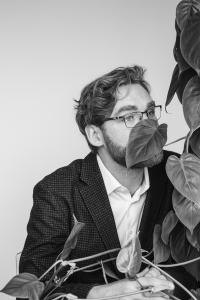Jakob Heller
Keywords: Bucolic Literature - Romanticism - Disanthropic Imagination
Affiliation: Martin-Luther-Universität Halle-Wittenberg

I work on German-language literature from the 18th and 19th centuries (with some forays into contemporary literature). My main focus is on the bucolic as a European literary genre and on Romanticism. Specifically, I am interested in:
First, constructions of nature in bucolic poetry. From a systematic perspective, I am interested in how cultural conceptions of ‘Natürlichkeit’ and nature are negotiated, critiqued, and subverted in bucolic texts. The genre has always existed in a tension between artificiality and naturalness, which has been addressed, for example, in rhetorical, anthropological, and horticultural terms, as well as in the representation of relations of human-to-human, human-to-animal, and human-to-plant care.
Second, ‘Naturphilosophie’ of Romanticism in its tension between mysticism and proto-ecology. I read Romantic natural philosophy as a productive adaptation of figures of monistic totality derived from the mystical discourse (Meister Eckhart, Johannes Tauler, Jakob Böhme). I am interested in how this discourse was reinterpreted in speculative natural history (A.G. Werner, H. Steffens, F. v. Baader) to articulate an ecological way of thinking.
And third, the aesthetic, rhetorical, and epistemological dimensions of the literary representation of disappearance and human absence. Here, I am particularly interested in what Greg Garrard referred to as the ‘disanthropic imagination’: the literary representations of a posthuman world. Connected to this are my studies on finitude in Romanticism, the analogy between geological time and human life processes, and the figure of the last man.
https://www.germanistik.uni-halle.de/neuere_literaturwissenschaft/fulda/dr._jakob_christoph_heller/
